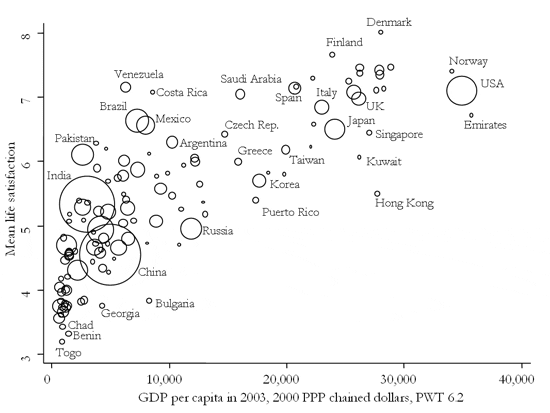PRINCETON, NJ -- Gallup World Poll data provide new evidence that all along the national income scale, life satisfaction rises with average income level.

The link between money and contentment has been a question of considerable interest to researchers since Richard Easterlin noted in a seminal 1974 paper that average national happiness does not increase over long spans of time, despite large increases in per-capita income. Others have since argued that life circumstances such as employment or marital status matter more than income, or that income only increases life satisfaction until basic needs are met.
In the graph, each circle is a country, with diameter proportional to population. The horizontal axis is national per-capita GDP in 2003 (the nearest year for which there is complete data) measured in purchasing power parity (PPP) dollars at 2000 prices, while the vertical axis is a country's average life-satisfaction rating. Most of the countries of sub-Saharan Africa are on the bottom left, India and China are the two large circles near the left, the western European countries appear near the upper right, and the United States is the large country on the top right.
As the graph indicates, life satisfaction is higher in countries with higher GDP per head. The slope is steepest among the poorest countries, where income gains are associated with the largest increases in life satisfaction, but it remains positive and substantial even among the rich countries; it is not true that there is some critical level of GDP per capita above which income has no further effect on life satisfaction. Instead, each doubling of income adds about the same amount to life satisfaction, across poor and rich countries alike.
In fact, a global map of average life satisfaction levels by country based on the Gallup World Poll data looks much the same as an income map of the world: the inhabitants of North America, Western Europe, Japan, Australasia, and Saudi Arabia are rich and well-satisfied with their lives, with average national life satisfaction scores in the range of 7.5- 8.5. The really unsatisfied places on the planet, with life satisfaction scores in the range of 3.1- 4.5, are in sub-Saharan Africa, plus Haiti and Cambodia.
Why Does Income Matter so Consistently Around the Globe?
It is far from clear why questions of life satisfaction should be so closely related to national incomes. Much of the literature on the topic emphasizes the relative nature of such responses; when people answer such questions, they must surely assess their life satisfaction relative to some benchmark, such as their own life in the past, or the lives of those around them. Indeed, a recent study by Andrew Clark, Paul Frijters, and Michael Shields found that life satisfaction is sensitive to respondents' income relative to those with whom they most closely associate, which implies that there should be no relation between average national life satisfaction and national income, unless there is some other aspect of national income that raises everyone's life satisfaction together.
A simpler interpretation of the Gallup World Poll findings is that when asked to imagine the best and worst possible lives for themselves, points "10" and "0" on the scale, people use a global standard. Danes understand how bad life is in Togo and other poor places, and the Togolese, through television and newspapers, understand how good life is in Denmark or other high-income countries.
Such an interpretation is also consistent with Easterlin's conclusion that the "best possible life for you" is a shifting standard that will move upward with rising living standards. Thus, we might expect the Danes to continue to maintain an average rating of 8 as national income rises, provided they stay in the same position in the global income rankings. If this interpretation is correct, it would be an indication of how much the globalization of information has affected the perceptions of populations worldwide -- because the consistently high correlation between income and satisfaction could not have existed in its absence.
Angus Deaton is a Gallup Senior Scientist, as well as the Dwight D. Eisenhower Professor of International Affairs at the Woodrow Wilson School of Public and International Affairs and Professor of Economics and International Affairs, both at Princeton University.